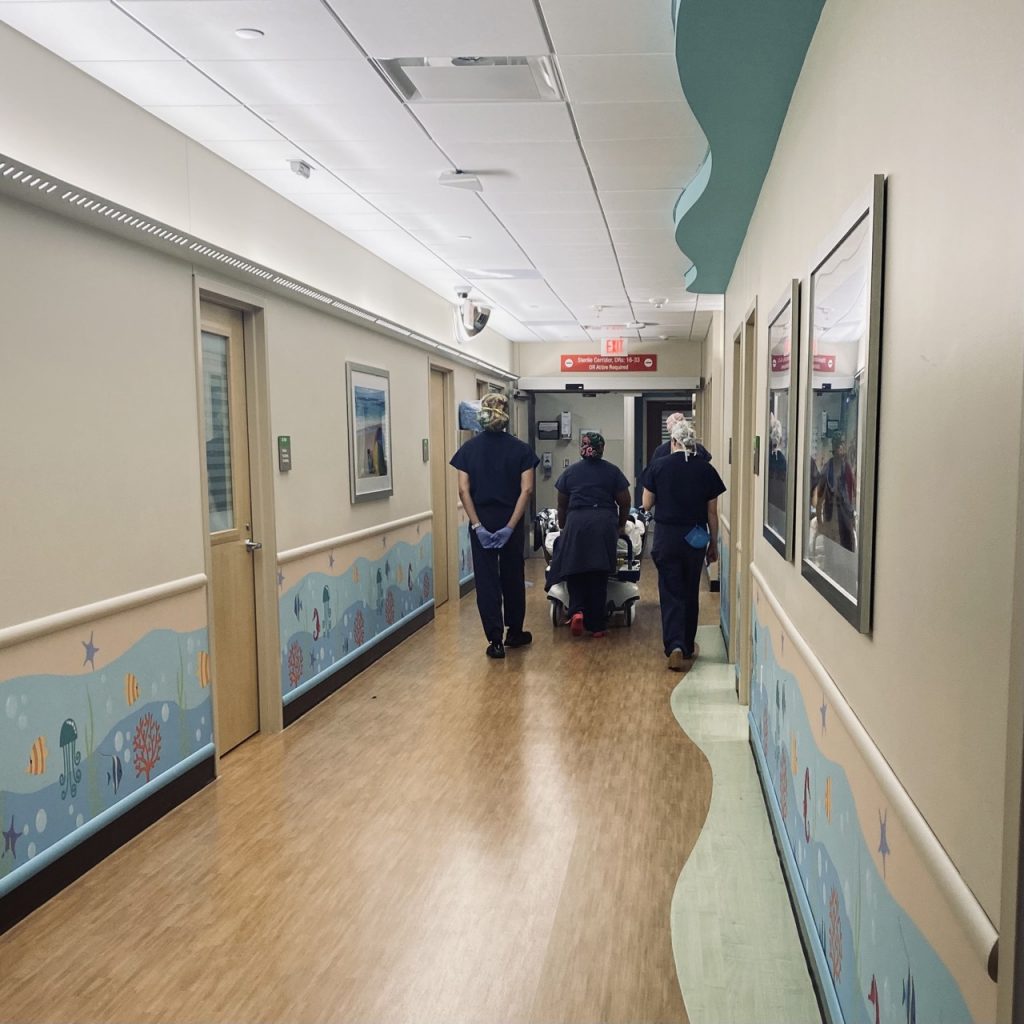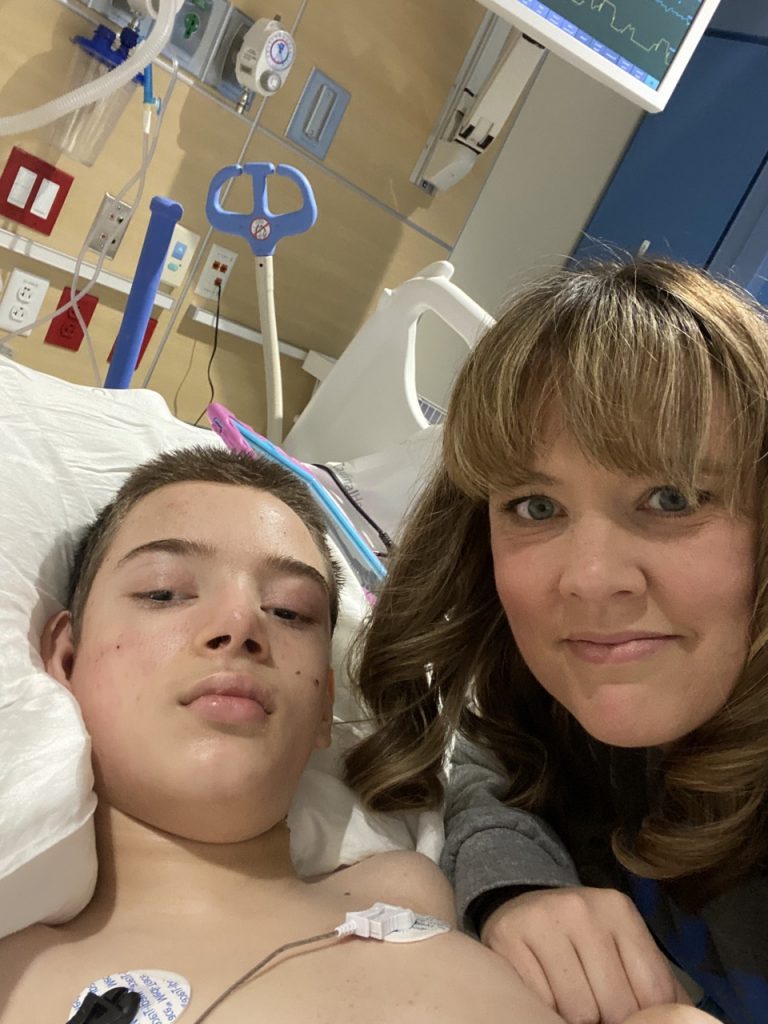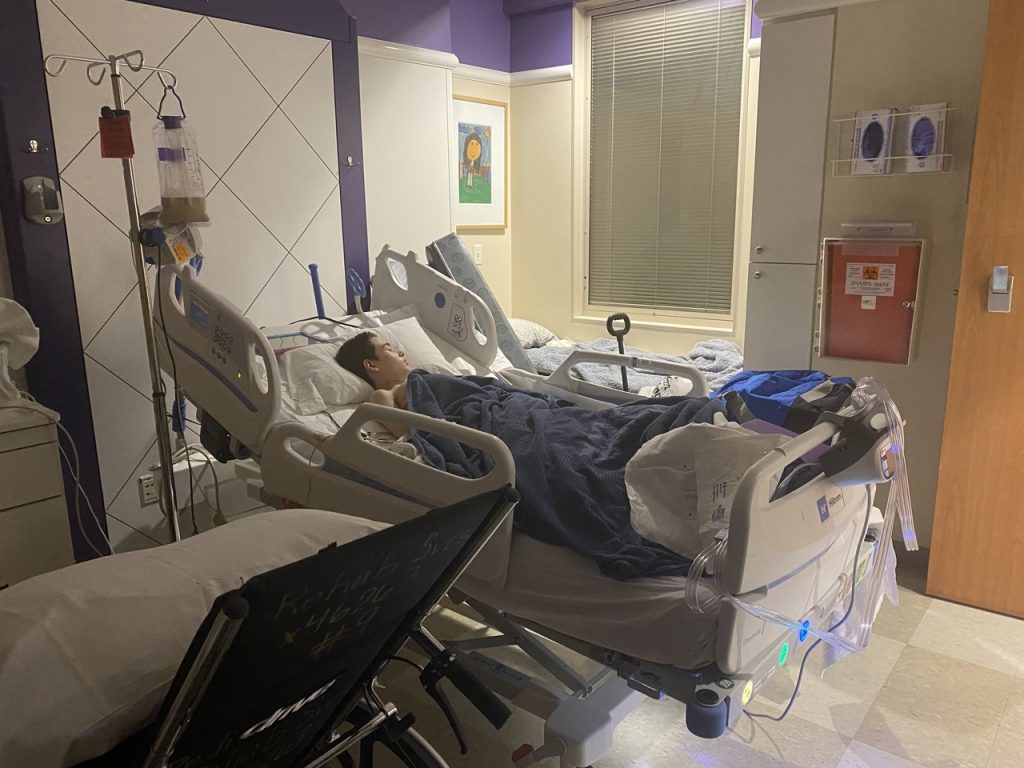My eleven-year-old son recently had major spine surgery and stayed in the hospital for 10 days. While this was stressful and exhausting, being prepared ahead of time helped both him as a patient and me as his caregiver as we navigated this experience. If you find yourself facing this with your own child, following these tips in preparing your child for surgery and a hospital admission will empower you to be involved in their medical care and recovery.
Preparing your child for surgery
 What to expect
What to expect
Ask your doctor if the hospital has a child life specialist or a pre-operative teaching class for children. A child life specialist is a trained member of the team who explains what will happen and why, in terms that a child will understand. Having a virtual or in-person tour of the hospital helps children see what to expect and gives them and their parents opportunities to ask questions.
Know the Who/What/When/Where of your child’s procedure:
- Who is my child scheduled to see?
- What procedure is my child having done?
- When should my child arrive for check-in?
- Where do I go for the scheduled procedure and where should I park my vehicle if driving?
Inquire about any COVID-19 protocols or policies that may impact your child’s admission or stay, including testing, masking and visitor requirements.
Have a list of current medications and allergies handy for quick, easy reference, as you will likely be interacting with a variety of different medical team members throughout your stay.
What to bring
Bringing familiar and favorite items to the hospital is vital in helping a child to feel safe, secure and to cope with being in a strange place. These can include pajamas and favorite toys, stuffed animals or blankets. Older children may want to bring their tablets or phones, but don’t forget chargers so everyone’s devices can stay fully powered. If the hospital has a child life program, they will have access to play items and play spaces for children to utilize.
Plan to Stay
Children look to their primary caregivers for comfort during new experiences. Having a parent or family member stay in the hospital is very important. Research shows that when caregivers are present and providing routine daily care of their own child, patients have improved sleep, are more cooperative with tasks, and parents feel less helpless.
Questions to ask about recovery
All procedures are different and come with their own guidelines and timelines for recovery, pain management and more. Therefore, the specific questions you may ask about post-surgery may vary slightly from what’s listed here. What is most important is thinking about what to expect once you’re back home and getting back into a routine. Life will go on after you’re discharged so it’s important to consider what you’ll need to know when it’s time to leave the hospital. If you are unclear about anything, please talk with your child’s care team.
- What is the best way to manage pain at home?
- When can my child go back to normal activities?
- Does my child need to be on a special diet after surgery?
- Do we have to stay overnight in the hospital and for how long?
- When do we follow up with the surgeon in clinic?
- What are symptoms that might be signs of a post-operative complication?
- Who can I call for questions or concerns after clinics are closed?
- How should things like bandage care and bathing be handled?
No matter how silly some of these questions may sound, ASK them. You are your child’s number 1 advocate and know them and your family’s day-to-day life better than anyone. So speak up until you understand the long-term plan.
Managing a lengthy hospital stay
Plan What You Can
If you know in advance approximately how long your child will be in the hospital, alert employers and educators as early as possible so they are aware of what is going on. This will make planning and scheduling so much easier for everyone involved. It’s also important to use this time to consider who will help you care for any other children you have, along with things that may need attention around your home such as pets.
Visitors
Being in the hospital for long periods of time is hard on anyone and more so for a child. Having visitors is a great way to help a child not feel so isolated from their families. However, not everyone is able to visit the hospital, so the new age of technology has allowed families and friends to remain connected by phone, Facetime, and social media.
Caregivers need to take breaks from being at bedside when a child is having a lengthy hospitalization. It is perfectly appropriate for family members to take turns being with a child so that the main caregiver can go home and do personal care tasks such as sleeping.
Sending Updates
Of course, family members and friends want to be updated on the status of your child, but providing updates can be time-consuming and exhausting. You may want to select one or two key family members or friends who you will directly communicate with and those individuals have a list of individuals to share that information. For long-term medical conditions that have repeat admissions, creating a Facebook page or Care Bridge is a great way to post updates.
Coping with emotions and stress
 Emotions and stress are flying high when you have a child who is sick and in the hospital. It is vital that the caregiver be intentional about self-care. Some ways to achieve this are:
Emotions and stress are flying high when you have a child who is sick and in the hospital. It is vital that the caregiver be intentional about self-care. Some ways to achieve this are:
- Taking breaks from the hospital to get rest
- Walking around the hospital or on the hospital grounds
- Eating regular meals to keep up your energy
- Talking with a good friend, child life specialist, social worker, or hospital chaplain
- Visiting the hospital chapel or meditation room
- Doing relaxing activities like reading, crafts, listening to music, walking, or simple exercises
- Having visitors who are there for the caregiver
Having your child go through surgery and a hospital admission can be stressful. But, being prepared and focusing on self-care as well as the care of your child will help make the experience as pleasant as possible.
 UTMB Health
UTMB Health
Website | (800) 917-8906
 The University of Texas Medical Branch (UTMB Health) system of care includes hospitals and emergency departments on four campuses, a network of primary and specialty care clinics, urgent care and walk-in services, and collaborations with physicians throughout the region. UTMB Health serves patients throughout Texas, and features an extensive network of primary and specialty care clinics and centers that complement hospitals on three campuses.
The University of Texas Medical Branch (UTMB Health) system of care includes hospitals and emergency departments on four campuses, a network of primary and specialty care clinics, urgent care and walk-in services, and collaborations with physicians throughout the region. UTMB Health serves patients throughout Texas, and features an extensive network of primary and specialty care clinics and centers that complement hospitals on three campuses.
Check out UTMB’s various locations
around the Houston area:
Alvin | Angleton | Dickinson | Friendswood | Galveston | Lake Jackson | League City|
Texas City | Webster | Regional | Urgent Care | Emergency Care

















